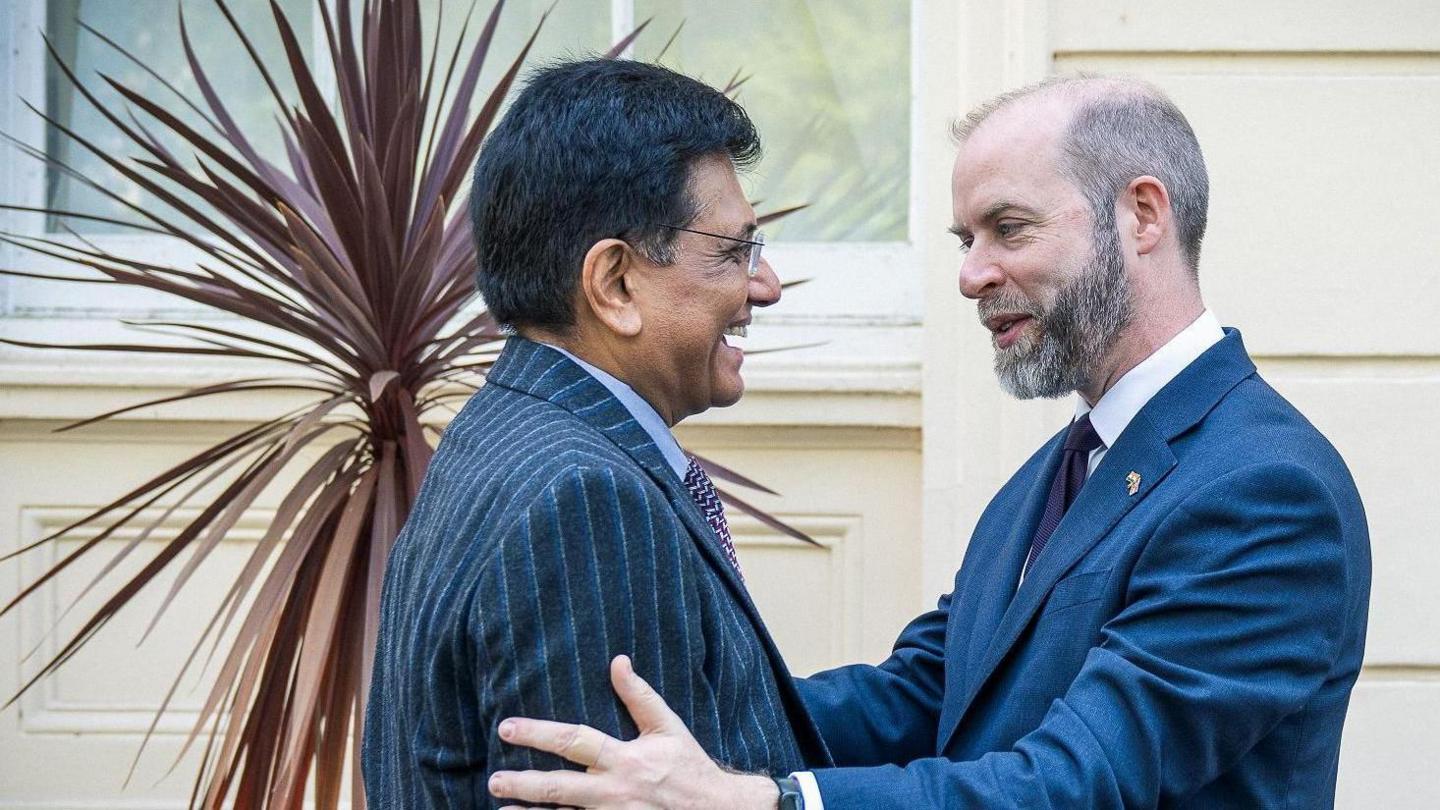Government defends NI exemption in UK-India trade deal

UK Business Secretary Jonathan Reynolds and India's Minister of Commerce and Industry Piyush Goyal met in London last week to finalise the deal
- Published
The UK government has hit back against claims by opposition parties that the newly-agreed trade deal with India could disadvantage British workers.
Business Secretary Jonathan Reynolds told the BBC there was "no situation" in which he would "ever tolerate" British workers being undercut as a result of a trade agreement.
One part of the deal extends an exemption on national insurance contributions (Nics) from one to three years - meaning people on short-term visas will only make social security payments in their home country when working abroad.
Opposition parties claim this could mean Indian workers are cheaper to employ than British workers - not least since UK employer Nics have just risen.
Conservative leader Kemi Badenoch claimed she had refused a similar trade-off when she was business secretary, because the deal contains "two-tier taxes" which would cost the UK "hundreds of millions".
Liberal Democrat deputy leader Daisy Cooper said the exemption risked "undercutting British workers at a time when they're already being hammered by Trump's trade war and Labour's misguided jobs tax".
Reform UK leader Nigel Farage described the deal as "truly appalling", adding: "This government doesn't give a damn about working people.
Four things you need to know about UK-India trade deal
- Published24 July
But Reynolds said the deal would not impact British workers, pointing out the UK has 16 agreements preventing double taxation of work, which cover more than 50 countries - including the US, EU and South Korea.
"The Conservatives recently, well a few years ago when they were in government, signed one with Chile for five years. So no, British workers are not being undercut," he said.
"What the Conservatives are confused about, and Reform as well, is a situation where a business in India seconds someone for a short period of time to the UK, or a UK business seconds a worker to India for a short period of time, where you don't pay in simultaneously now to both social security systems," he told the BBC's Today programme.
But Conservative MP Matt Vickers said his party was not "confused".
"We always want to see trade deals done with other countries… that's what we had Brexit so we could open up some of those deals, but actually this is a bad deal."
Reynolds said the deal was a "huge economic win for the UK and would deliver "faster growth, higher wages, more tax revenue brilliant wins for goods and for services".
He said previously that Indian workers would still be required to pay the NHS immigration surcharge and would not be eligible for benefits from the National Insurance system.
The Business Secretary also dismissed opposition claims that many more Indian workers would come to the UK than British workers would go to India.
'Gamechanger' for Scotch whisky industry
The deal - which took three years to negotiate - will make it easier for UK firms to export some goods including whisky, cars and other products to India, and cut taxes on India's clothing and footwear exports to the UK.
Last year, trade between the two countries totalled £42.6bn. The government has said the deal would boost that trade by an additional £25.5bn a year by 2040.
The UK government said lowering tariffs on the likes of clothing, jewellery, and frozen prawns "could" lead to cheaper prices and more choice for consumers.
The Scotch Whisky Association (SWA), which is set to benefit from Indian tariffs being lowered, said it could increase Scotch exports to the country by £1bn over the next five years, creating 1,200 jobs across the UK
Tariffs on Scotch whisky are set to fall from 150% to 75% and are expected to be tapered down to 40% over the next decade.
Jean-Etienne Gourgues, chair of the SWA and chief executive of Chivas Brothers, said the deal was a "gamechanger" for the industry.
"We will have suddenly 10 million consumers who cannot today afford our product, which will be in a position to afford our product so that's a big change for us," he told the BBC.
He added it would provide "a lot of safety and long term safety" for the business.
"We're going to increase the number of jobs because everything is produced in Scotland, so the more we produce the more people we need so it will have a straight impact directly for us but also indirectly with all the companies we're working [with]," he said.
The Department for Business and Trade said for the first time, UK firms would have "guaranteed and unprecedented access to India's vast procurement market" with access to "approximately 40,000 tenders with a value of at least £38bn a year".
"We are the only other country in the world with access to that procurement market so when you have that kind of success that will involve more British workers on a short term basis going to India," Reynolds said.
He said it was the biggest trade deal the UK had done since Brexit and that it would "benefit every part of the UK, but particularly Scotland, the North, the Midlands because of where some of our industries are located".